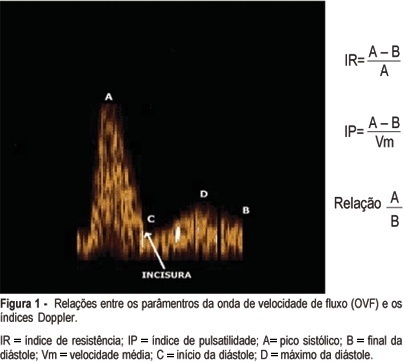Summary
Revista Brasileira de Ginecologia e Obstetrícia. 2005;27(6):323-330
DOI 10.1590/S0100-72032005000600006
PURPOSE: to determine the validity of uterine artery Doppler velocimetry for the prediction of pregnancy complications in a population of low-risk nulliparae. SUBJECTS: a prospective study was conducted on 45 patients in their first pregnancy with no history of chronic diseases. Uterine artery Doppler velocimetry was performed between 24 and 26 weeks, with the determination of resistance index (RI), pulsatility index (PI), S/D ratio, and the presence or absence of incisure in the flow velocity wave. Data were analyzed by the Mann-Whitney test for non-parametric samples, and the Fisher exact test was used in the evaluation of the qualitative parameters. RESULTS: pregnancy complications were observed in twelve patients, with four cases of preeclampsia, one case of small for gestational age newborn (SGA NB), one case of SGA NB + preterm delivery (PTD), three cases of PTD, one case of fetal centralization, and two cases of presence of thick meconium in the amniotic fluid at the time of pregnancy resolution. We noted that RI (median 0.56 x 0.68), PI (median 0.98 x 1.29) and S/D ratio (median 2.2 x 2.9) were higher at the examination performed between 24 and 26 weeks in patients with complications and did not differ in preeclampsia and SGA cases. The presence of bilateral incisure showed 100 and 90% sensitivity, 60.2 and 62.5% specificity, 29.4 and 42,9% positive predictive value (PPV), and 100 and 95.2% negative predictive value (NPV) for the detection of preeclampsia or SGA and of any complication of pregnancy, respectively. An altered Doppler showed 83.3 and 83.3% sensitivity, 69.7 and 69.7% specificity, 33.3 and 50.0% PPV, and 95.8 and 92.0% NPV for the detection of preeclampsia or SGA and of any complication of pregnancy, respectively. CONCLUSION: high impedance indices and the presence of a bilateral incisure in the uterine arteries between 24 and 26 weeks of pregnancy seem to be good predictors of pregnancy and perinatal complications.
